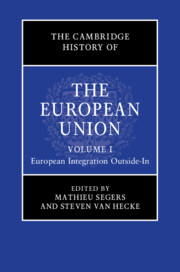Book contents
- The Cambridge History of the European Union
- The Cambridge History of the European Union
- The Cambridge History of the European Union
- Copyright page
- Contents
- Figures
- Contributors to Volume I
- Acknowledgements
- Abbreviations
- Reflections on the History and Historiography of European Integration
- Part I Critical Junctures
- Part II Multilateralism and Geopolitics
- Market, Society and Security
- Global Challenges: International Politics, the Planet and the Universe
- 13 European Integration and the United Nations
- 14 The European Nuclear Dimension: From Cold War to Post-Cold War
- 15 From ‘Helsinki’ and Development Aid to Multipolar Hard Ball
- 16 European Integration, the Environment and Climate Change
- 17 The Space Policy of the European Union
- Part III Perspectives and Ideas
- Index
- References
13 - European Integration and the United Nations
from Global Challenges: International Politics, the Planet and the Universe
Published online by Cambridge University Press: 21 October 2023
- The Cambridge History of the European Union
- The Cambridge History of the European Union
- The Cambridge History of the European Union
- Copyright page
- Contents
- Figures
- Contributors to Volume I
- Acknowledgements
- Abbreviations
- Reflections on the History and Historiography of European Integration
- Part I Critical Junctures
- Part II Multilateralism and Geopolitics
- Market, Society and Security
- Global Challenges: International Politics, the Planet and the Universe
- 13 European Integration and the United Nations
- 14 The European Nuclear Dimension: From Cold War to Post-Cold War
- 15 From ‘Helsinki’ and Development Aid to Multipolar Hard Ball
- 16 European Integration, the Environment and Climate Change
- 17 The Space Policy of the European Union
- Part III Perspectives and Ideas
- Index
- References
Summary
This chapter analyses how the United Nations (UN) as an intergovernmental organisation, has shaped the functioning of the European Union (EU) and its member states in global governance over the years. The EU is often seen, both by scholars and by practitioners, as a special, even unique actor in the UN context, characterised by high levels of support, cooperation, institutionalisation and formalisation.
This chapter approaches uniqueness not as a mantra, but as a question of empirical validation, by zooming in on the UN General Assembly (UNGA). This organ embodies the principle of universality by bringing together all UN members and, in addition, allowing a wide variety of observers to participate in its work, including the EU. While the latter’s functioning is well-documented, there remain some blind spots to be addressed, such as the UNGA’s decision to grant the European Economic Community (EEC) observer status in October 1974.
- Type
- Chapter
- Information
- The Cambridge History of the European Union , pp. 345 - 365Publisher: Cambridge University PressPrint publication year: 2023

